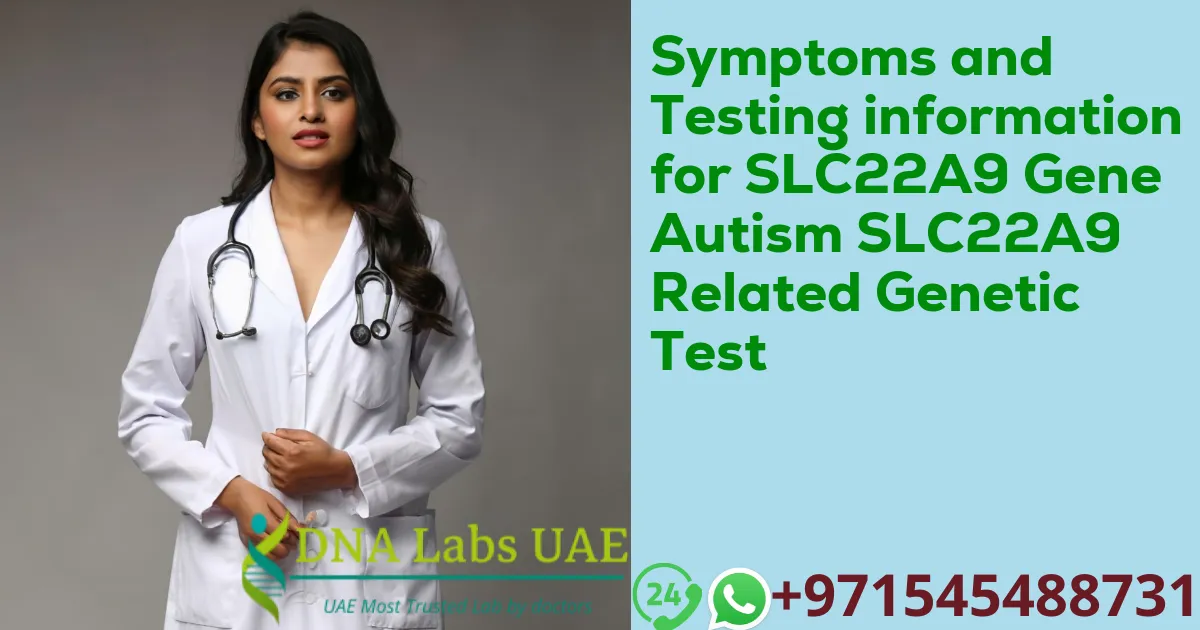Autism Spectrum Disorder (ASD) is a complex developmental condition that involves persistent challenges in social interaction, speech, and nonverbal communication, along with restricted/repetitive behaviors. The symptoms are usually seen in the early developmental period. However, the intensity and manifestation of these symptoms can vary widely among individuals. Recent advancements in genetic research have led to the discovery of various genes associated with ASD, one of which is the SLC22A9 gene.
The SLC22A9 gene is a member of the solute carrier family, which plays a crucial role in the transport of organic ions and other molecules across cellular membranes. Mutations or variations in this gene have been linked to an increased risk of developing autism, making it a significant focus of genetic testing for ASD.
Symptoms Associated with SLC22A9 Gene Mutations
Individuals with mutations in the SLC22A9 gene may exhibit a range of symptoms, consistent with the broader spectrum of autism. These symptoms include, but are not limited to:
- Difficulty with social interactions: This can manifest as challenges in understanding social cues, difficulty in making friends, or a lack of interest in socializing.
- Communication challenges: This includes delayed speech development, difficulty maintaining a conversation, or repetitive use of language.
- Repetitive behaviors: Individuals may display repetitive movements, such as rocking or hand-flapping, or have specific routines or rituals that they are unwilling to change.
- Sensory sensitivities: There may be heightened or reduced sensitivities to sensory inputs like sound, light, or touch.
It is important to note that the presence of these symptoms alone does not confirm an SLC22A9 gene mutation. A genetic test is required to accurately diagnose the involvement of the SLC22A9 gene in autism.
SLC22A9 Related Genetic Test
The SLC22A9 related genetic test is a specialized test designed to identify mutations in the SLC22A9 gene that are associated with autism. This test involves collecting a DNA sample, usually through a blood draw or a cheek swab, which is then analyzed in a laboratory to detect any genetic abnormalities in the SLC22A9 gene.
Understanding the genetic basis of autism can be crucial for families. It not only provides a clearer diagnosis but also helps in tailoring interventions and therapies to suit the individual needs of the person affected by ASD. Furthermore, it can provide valuable information for family planning and the assessment of the risk of autism in future pregnancies.
The cost of the SLC22A9 related genetic test is 4400 AED. While the cost may seem significant, the insights gained from this testing can be invaluable for affected families. It offers a pathway to better understand the condition, enabling more effective management and support strategies.
For more information or to schedule a test, interested individuals can visit DNA Labs UAE. This link provides detailed information about the test, including how to prepare for it and what to expect from the results.
In conclusion, the SLC22A9 related genetic test represents a significant advancement in the understanding and management of Autism Spectrum Disorder. By identifying specific genetic markers associated with ASD, it opens up new avenues for personalized care and support, making a profound difference in the lives of those affected and their families.



